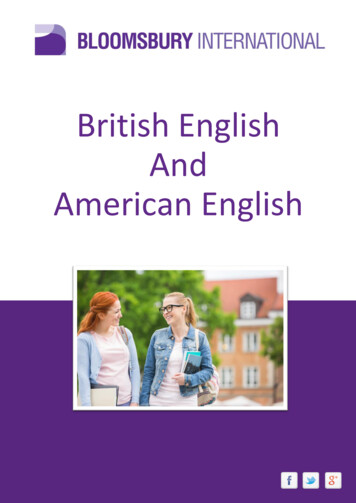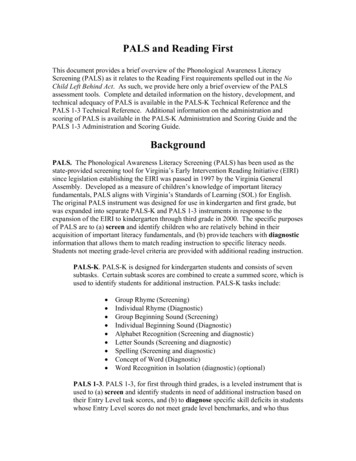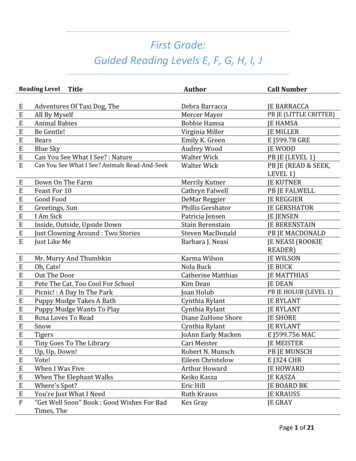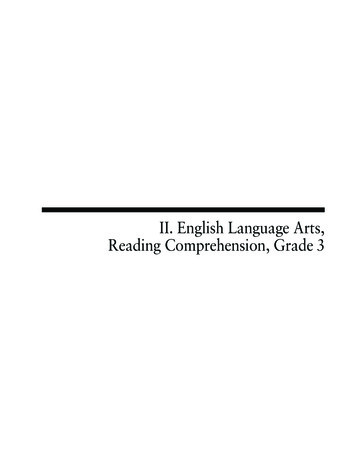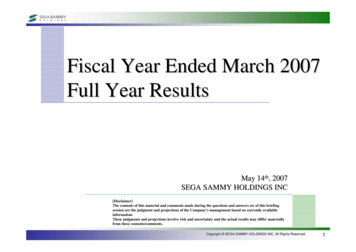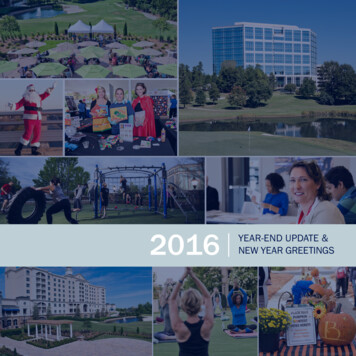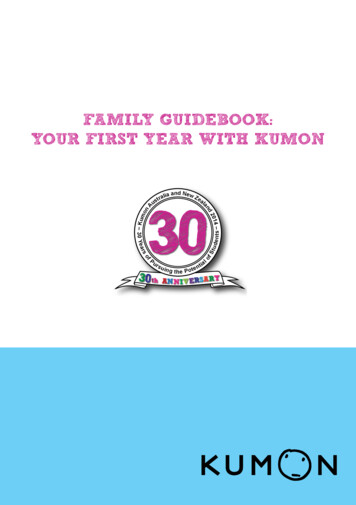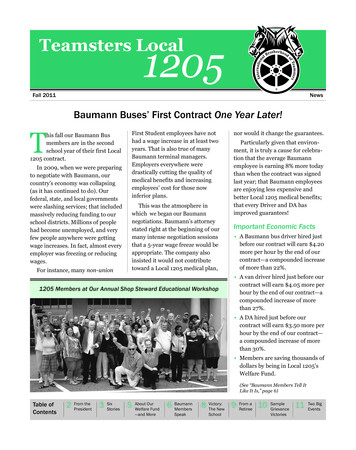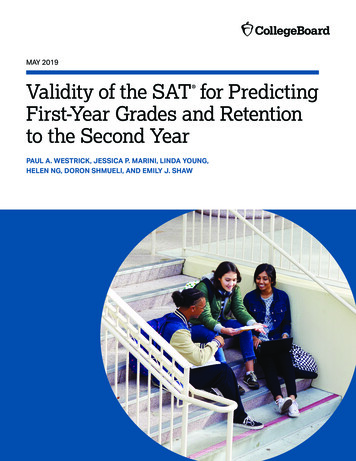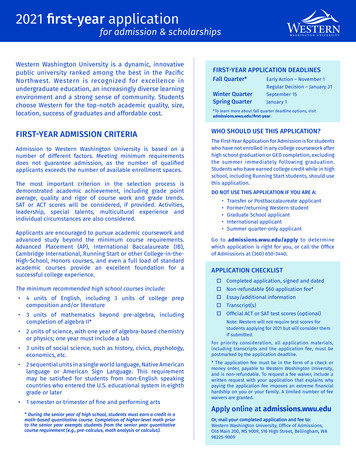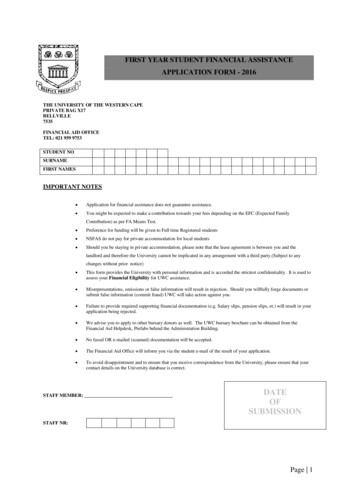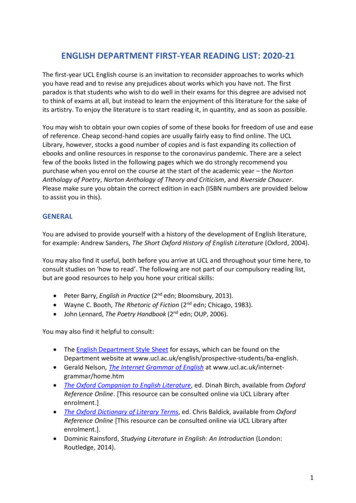
Transcription
ENGLISH DEPARTMENT FIRST-YEAR READING LIST: 2020-21The first-year UCL English course is an invitation to reconsider approaches to works whichyou have read and to revise any prejudices about works which you have not. The firstparadox is that students who wish to do well in their exams for this degree are advised notto think of exams at all, but instead to learn the enjoyment of this literature for the sake ofits artistry. To enjoy the literature is to start reading it, in quantity, and as soon as possible.You may wish to obtain your own copies of some of these books for freedom of use and easeof reference. Cheap second-hand copies are usually fairly easy to find online. The UCLLibrary, however, stocks a good number of copies and is fast expanding its collection ofebooks and online resources in response to the coronavirus pandemic. There are a selectfew of the books listed in the following pages which we do strongly recommend youpurchase when you enrol on the course at the start of the academic year – the NortonAnthology of Poetry, Norton Anthology of Theory and Criticism, and Riverside Chaucer.Please make sure you obtain the correct edition in each (ISBN numbers are provided belowto assist you in this).GENERALYou are advised to provide yourself with a history of the development of English literature,for example: Andrew Sanders, The Short Oxford History of English Literature (Oxford, 2004).You may also find it useful, both before you arrive at UCL and throughout your time here, toconsult studies on ‘how to read’. The following are not part of our compulsory reading list,but are good resources to help you hone your critical skills: Peter Barry, English in Practice (2nd edn; Bloomsbury, 2013).Wayne C. Booth, The Rhetoric of Fiction (2nd edn; Chicago, 1983).John Lennard, The Poetry Handbook (2nd edn; OUP, 2006).You may also find it helpful to consult: The English Department Style Sheet for essays, which can be found on theDepartment website at ish.Gerald Nelson, The Internet Grammar of English at www.ucl.ac.uk/internetgrammar/home.htmThe Oxford Companion to English Literature, ed. Dinah Birch, available from OxfordReference Online. [This resource can be consulted online via UCL Library afterenrolment.]The Oxford Dictionary of Literary Terms, ed. Chris Baldick, available from OxfordReference Online [This resource can be consulted online via UCL Library afterenrolment.].Dominic Rainsford, Studying Literature in English: An Introduction (London:Routledge, 2014).1
TEXTS FOR FIRST-YEAR COURSESThe Norton Anthology of Poetry, ed. Margaret Ferguson, Tim Kendall, Mary Jo Salter, 6th edn(Norton, 2018), ISBN 9780393679021. This book is used on the Narrative Texts strand of thefirst-year course and a copy should be purchased for your personal use throughout yourtime in the Department.1. Narrative TextsChristopher Marlowe, Hero and Leander (1598 text), in The Norton Anthology of Poetry (seeabove).John Milton, Paradise Lost (1667, revised 1674), ed. John Leonard (Penguin). You may wishto consult the excellent annotations provided by Alastair Fowler in the Longman edition.Alexander Pope, The Rape of the Lock (1714), in The Norton Anthology of Poetry (see above).William Wordsworth, The Prelude (1805 text), in William Wordsworth: The Major Works, ed.Stephen Gill (Oxford World’s Classics).Frederick Douglass, Narrative of the Life of Frederick Douglass, an American Slave (1845), ed.Deborah E. McDowell (Oxford World’s Classics).George Eliot, The Mill on the Floss (1860), ed. Juliette Atkinson (Oxford World’s Classics,2015).T. S. Eliot, The Waste Land (1922) in The Norton Anthology of Poetry (see above). You maywish to consult the excellent annotations provided by Christopher Ricks and Jim McCuein The Poems of T.S. Eliot, vol. 1 (Faber 2015).Toni Morrison, Beloved (1987) (Vintage).2. Introduction to Medieval Language and LiteratureThis course is taught in two parts, Middle English in the autumn term and Old English in thespring term. The Old English literary period falls approximately within 700–1100, the Middlewithin 1100–1500. The Middle English is placed first in order to ease students into what maybe considered the least familiar period of literature studied on the first-year course.Most medieval literature can be challenging, especially with the Cheshire dialect of SirGawain and the Green Knight. Later on the first year, we will turn to Old English, which is thelanguage spoken and written in Anglo-Saxon England before the Norman Conquest of 1066.You will be taught Beowulf in Seamus Heaney’s translation, and enough Old English languageto be able to read The Wanderer, the other text on this half of the course, as its Anglo-Saxonpoet composed it.2
You may find much of this literature completely new, but we hope you will see that itrepresents something of the greatness which the English literary tradition has achieved. Inteaching Old and Middle English we ensure that our Department covers English frombeginning to end. This is what makes us different from most other departments of Englishlanguage and literature.Please make preparation for your studies by reading at least the first and second MiddleEnglish texts, plus the underlined items in the Old English section, in the summer precedingyour enrolment on the course.Middle EnglishTaken in order, the works we study in class this term are The Miller’s Tale of GeoffreyChaucer’s Canterbury Tales, the north-west Midlands romance Sir Gawain and the GreenKnight, the last two books of Sir Thomas Malory’s Morte Darthur (to be found in his Works,listed below), and a play, The Wakefield Second Shepherds’ Pageant. The editions for theseare listed in order below. Burrow’s book provides valuable elements of the literarybackground.Larry D. Benson (ed.), The Riverside Chaucer, 3rd edn (OUP, 2008), ISBN 9780199552092. Thisbook is also needed for second-year study: a copy should be purchased for your personal usethroughout the course.J.J. Anderson (ed.), Sir Gawain and the Green Knight, Pearl, Cleanness, Patience (Everyman,1996), ISBN-10: 0460875108 or ISBN-13: 9780460875103.Eugene Vinaver (ed.), Malory: Works (OUP, 1977), ISBN-10: 0192812173 or ISBN-13:9780192812179.A.C. Cawley (ed.), Everyman and Medieval Miracle Plays (Everyman, 1993), ISBN-10:046087280X or ISBN-13: 9780460872805.J.A. Burrow, Medieval Writers and their Work (OUP, 1982), ISBN 9780199532049.Old EnglishThis course consists of Seamus Heaney’s translation of the epic poem Beowulf, followed byone poem in the original Old English language, The Wanderer. The quickest way into thelanguage and context is Peter S. Baker’s chapter on the Old English language in ‘Beowulf’ &Other Stories, and we recommend that you read this and surrounding chapters first. For TheWanderer, read Jenny Neville’s chapter on the Elegies in the same volume.Daniel Donoghue (ed.), The Norton Critical Edition of Heaney’s ‘Beowulf’ (W.W. Norton andCo., 2002). ISBN: 03939758003
Peter S. Baker (ed.), Introduction to Old English, 3rd edn (Blackwell, 2012), ISBN9780470659847. Chapters Four (on Case), Six (on Nouns: 6.1: Quick Start), Seven (7.1:Quick Start).Richard North and Joe Allard (ed.), ‘Beowulf’ & Other Stories, 2nd edn (Pearson Longman,2011), ISBN 9781408286036. Chapters Three (on Beowulf), Five (on Riddles, Elegies and TheWanderer), Eleven (on the Old English Language)You may also wish to consult The Longman Anthology of Old English, Old Icelandic andAnglo-Norman Literatures (Pearson Longman, 2011), ed. Richard North, Joe Allard, andPatricia Gillies, ISBN 9781408247709, which is not required for the course, but features moreliterature from the period.3. Criticism and TheoryThis course makes use of The Norton Anthology of Theory and Criticism, 3rd edn (2018), ISBN9780393602951, as a core reference work, and you are strongly encouraged to buy yourown copy, and to dip into it in advance over the summer. The volume will also be of use youin your second and third years. The essays lectured on and discussed in seminars during theSpring Term of the first year, all printed in the anthology, are as follows: Philip Sidney, An Apology for Poetry (c. 1580, published 1595)Samuel Johnson, ‘Preface’ to his edition of Shakespeare’s plays (1765)Wordsworth, ‘Preface’ to the Lyrical Ballads (1802)Henry James, ‘The Art of Fiction’ (1884)T. S. Eliot, ‘Tradition and the Individual Talent’, from The Sacred Wood (1920)Roland Barthes, ‘The Death of the Author’ (1967)Tzvetan Todorov, ‘Structural Analysis of Narrative’ (1969)Héléne Cixous, ‘The Laugh of the Medusa’ (1975)Chinua Achebe, ‘An Image of Africa’ (1975)Eve Kosofsky Sedgwick, ‘Introduction’ to Epistemology of the Closet (1990)4. Intellectual and Cultural SourcesThis is a long list – but do not be daunted. Think of the list as a sample of the world of booksand ideas in which you are free to travel for the next few years. Read as much as you can.Read the ones which interest you most. Read some more carefully than others if it suits you.You can and will go back to some of them later in your degree course. The editions andtranslations recommended below are those on which the examination will be based. In thecases of some longer works you are directed to particular parts; lectures and seminars willfor the most part concentrate on these sections, and passages for comment in theexamination will be taken from them.In the case of translations, it is important that you obtain a copy of the recommendededition. If you are having trouble finding any of these, try and check the following: the UCLLibrary (once you have enrolled at the start of term), Waterstones, Amazon UK,BookFinder.com, Abebooks.co.uk.4
The Bible (Authorized Version 1611), ed. Stephen Prickett (Oxford World’s Classics). The setsections are Genesis (500s BC?) and The Gospel of St. Mark (c. 70 AD).Homer, The Odyssey (700s BC?), trans. Emily Wilson (Norton, 2020).Sophocles, Oedipus the King (420s BC), in The Three Theban Plays, trans. Robert Fagles(Penguin).Plato, The Symposium (c. 380 BC), trans. Christopher Gill (Penguin).Aristotle, Poetics (330s BC), trans. Malcolm Heath (Penguin).Virgil, The Aeneid (20s BC), trans. by David West (Penguin), especially books 1-6.Ovid, Metamorphoses (8 AD), trans. David Raeburn (Penguin), especially books 1, 3, 4-6, 10,15.St. Augustine, Confessions (c. 397), trans. Henry Chadwick (Oxford World’s Classics),especially books 1–2, 6, 8, 11.Boethius, The Consolation of Philosophy (c. 524), trans. Douglas C. Langston (Norton CriticalEdition), especially Books 1, 3 and 5.Dante, Inferno (1310s), trans. Robin Kirkpatrick (Penguin).Sir Thomas More, Utopia (1516), trans. George M. Logan (Norton Critical Edition).Michel de Montaigne, Essays (1580, 1588), trans. J.M. Cohen (Penguin), especially ‘To theReader’, ‘On the Education of Children’, ‘On Cannibals’, ‘On the Custom of Wearing Clothes’,‘On Experience’.Jean Jacques Rousseau, Confessions (1760s), trans. J.M. Cohen (Penguin), especially Books I–III.Mary Wollstonecraft, A Vindication of the Rights of Woman (1792), ed. Miriam Brody(Penguin), especially chapters 1–4, 7–9, 12, 13 sections ii and vi.Karl Marx and Friedrich Engels, The Communist Manifesto (1848), ed. David McLellan(Oxford World’s Classics).Charles Darwin, On the Origin of Species (1859), ed. Gillian Beer (Oxford World’s Classics),especially chapters 1, 3–4, 9–10, 14.Friedrich Nietzsche, On the Genealogy of Morals (1887), trans. Douglas Smith (OxfordWorld’s Classics), especially Essay 1.5
Sigmund Freud, The Interpretation of Dreams (1899), trans. A. A. Brill (London: WordsworthEditions), especially Chapter 5, pages 155-61, and Chapter 6, pages 169–220 and 310–352.Virginia Woolf, A Room of One’s Own (1929) (Penguin).Michel Foucault, The History of Sexuality Volume 1: The Will to Knowledge, trans. RobertHurley (1976) (Penguin).Edward W. Said, Orientalism (1978) (Penguin), especially ‘Introduction’ and Chapter 1 (‘TheScope of Orientalism’).6
George Eliot, The Mill on the Floss (1860), ed. Juliette Atkinson (Oxford World’s lassics, . Please make preparation for your studies by reading at least the first and second Middle English texts, plus the underlined items in the Old English section, in the summer preceding your enrolment on the course. Middle English Taken in order, the works we study in class this term are The Miller’s .
